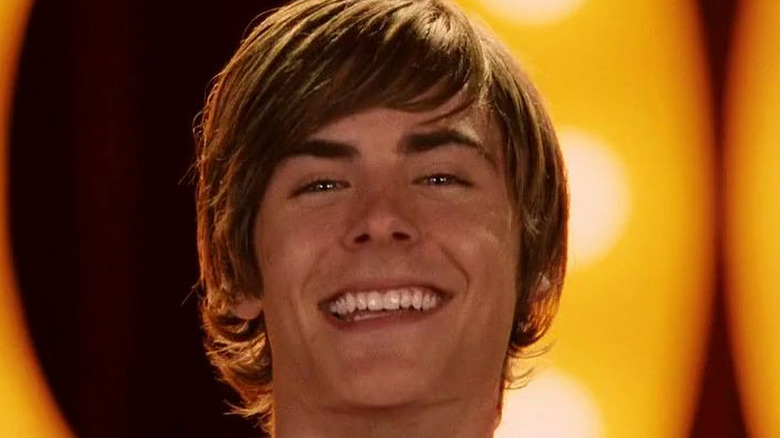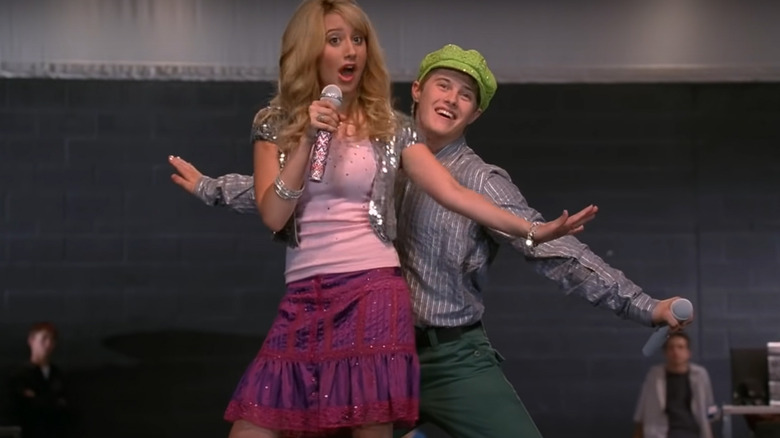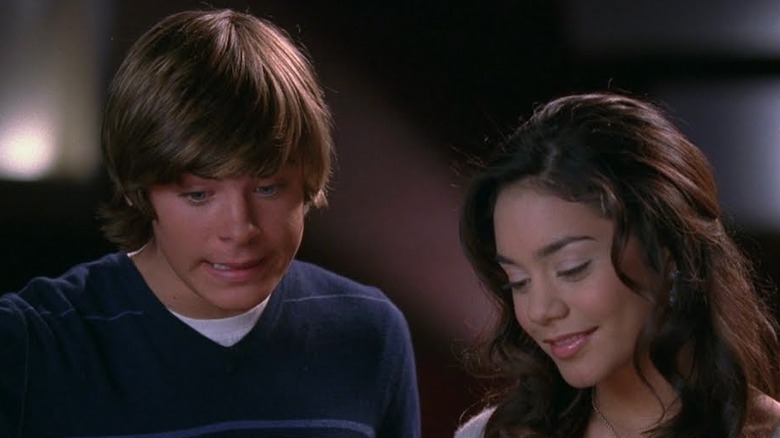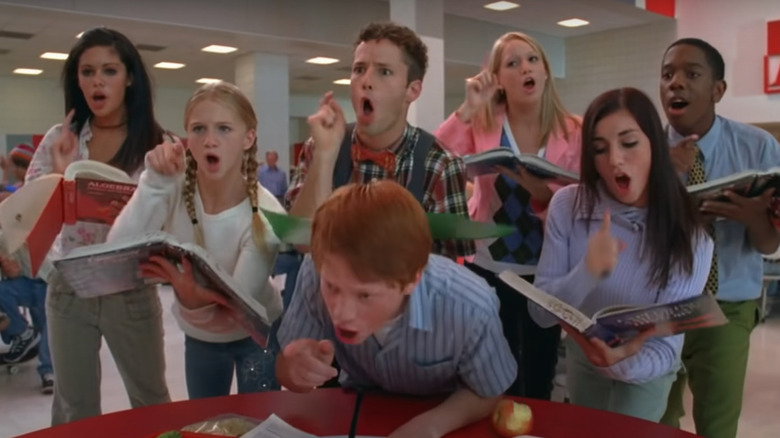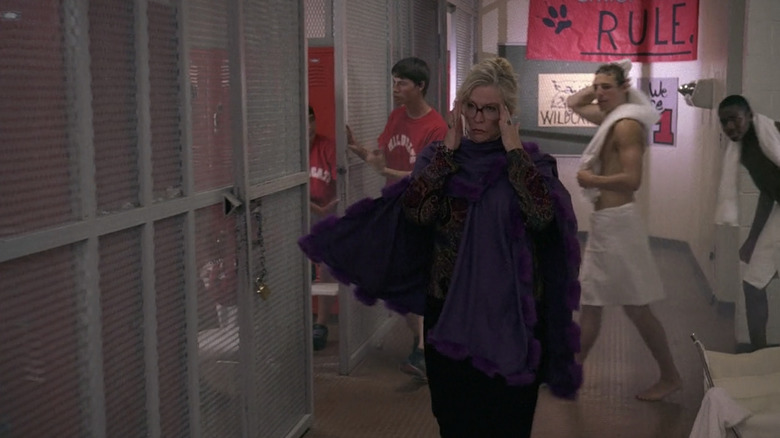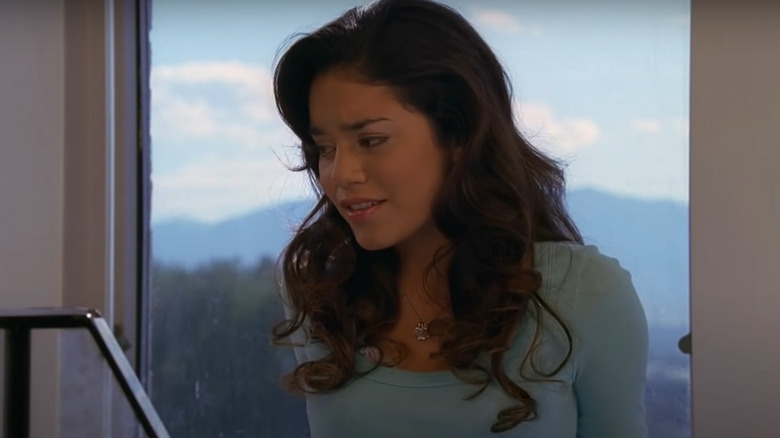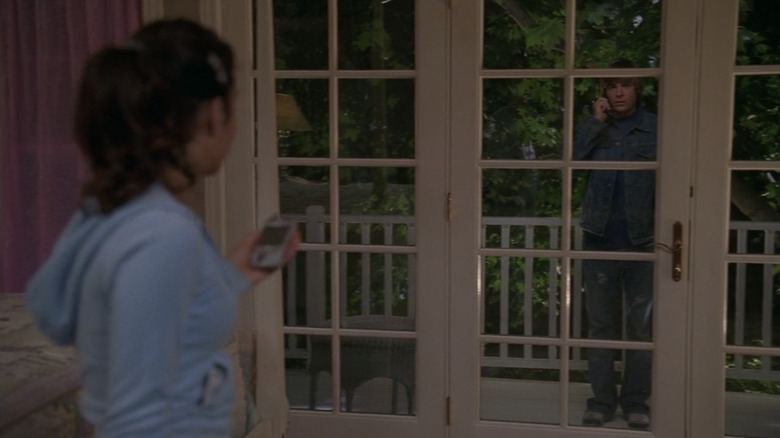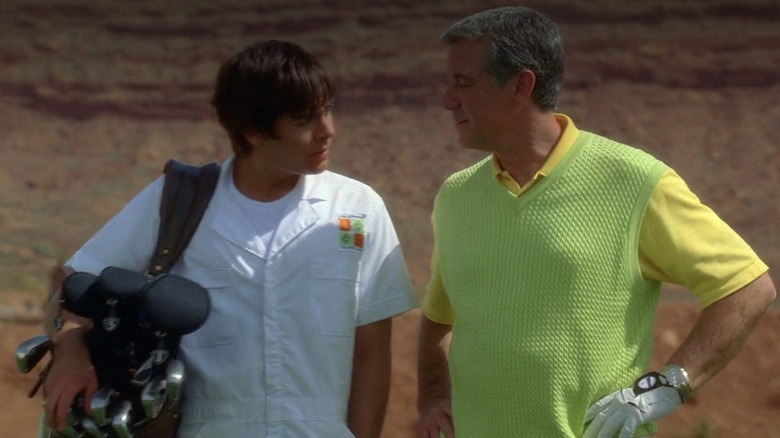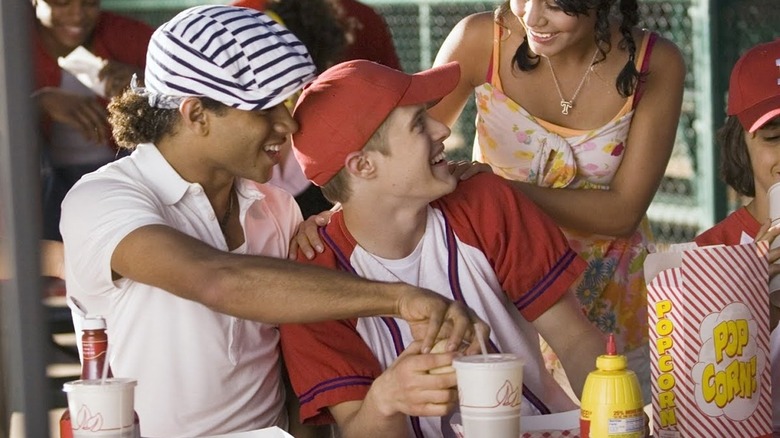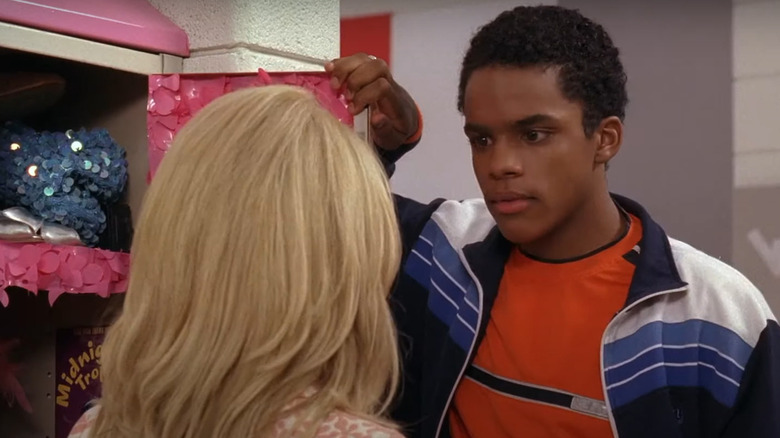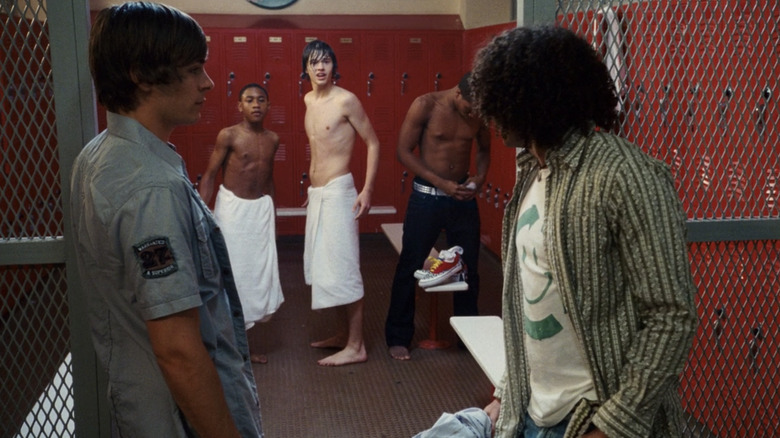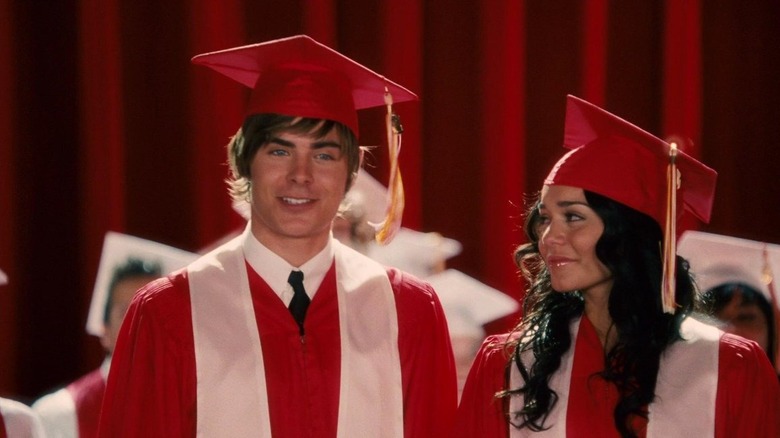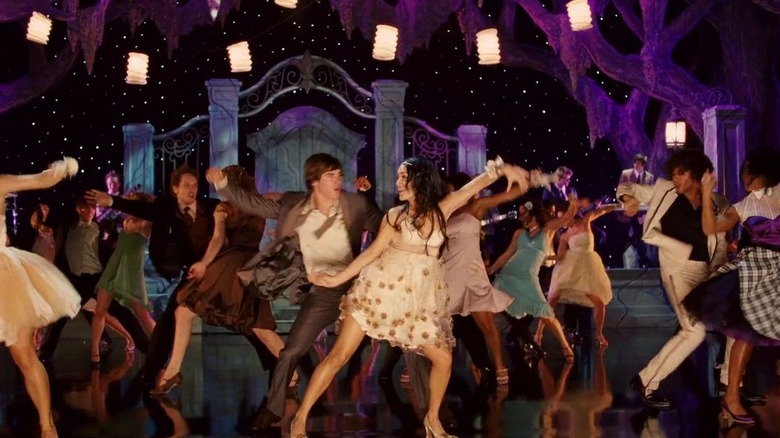Questionable Things We Ignored In The High School Musical Movies
"High School Musical" bopped to the top of everyone's favorite teen movies list back in 2006 when it first aired on the Disney Channel. With a classic jock-meets-geek premise and an added musical twist, its success is no surprise. The "High School Musical" trilogy put actors like Zac Efron, Vanessa Hudgens, and Ashley Tisdale on the map, and remains a nostalgic favorite for many — you can go into almost any millennial or Gen Z-occupied space and receive an impassioned "Wildcats!" in response to "What team?"
But "High School Musical" isn't without some pretty significant flaws. Some of them are noticeable even to a kid, while others take a bit more maturity to catch. Between the stalker vibes several characters give off to the blatantly terrible conduct of certain teachers, we can't un-see these suspect plotlines. These are the most questionable things we ignored in the "High School Musical" movies.
Star-crossed siblings?
Hey, Ms. Darbus, does it strike you at all as weird that you frequently cast siblings as romantic leads in your musicals? No? Listen, we know that Ryan and Sharpay don't actually want to hook up (thank the theater gods), but the weird vibe that takes hold of them when they're in the spotlight is too much.
Let's put this plotline to the test with a real-life scenario. Say Hollywood is developing a new adaptation of "Romeo and Juliet," and the producers cast Hollywood siblings as the legendary lovers. That would be weird, no? The project would be dead in a day, doomed to become one of those hushed-up Hollywood failures journalists are warned not to bring up in interviews.
We get that East High isn't exactly teeming with theater talent — just look at the audition sequence. But this is not the answer. If you only have two talented siblings at your disposal, then start doing shows with sibling characters or platonic leads. No one needs to see Sharpay and Ryan sing love songs together. Heck, Kelsey writes the music herself, so it's not like they're only pulling from existing material! And anyway, plays like Shakespeare's "Twelfth Night" exist!
Troy and Gabriella get special treatment
Real talk: Troy and Gabriella should never have gotten a callback in "High School Musical." While we tend to paint Ryan and especially Sharpay as the movie's villains, are they really? The duo has trained for years to reach the heights they occupy. Meanwhile, Troy and Gabriella can't even be bothered to show up to audition on time, and always put other extracurriculars ahead of theater. They're talented, sure, but theater needs discipline. If they're unwilling to show up on time and put in the significant amount of effort and practice required for a leading role, they should play a smaller part, as Sharpay suggests.
Granted, Sharpay handles the situation terribly. But she still has a point. Of course, we root for Troy and Gabriella because they're the protagonists, but they really shouldn't have gotten a callback when they're late and don't even technically audition. Darbus should have honored her original stance and refused their tardy try-outs. Moreover, throughout the series, Troy and Gabriella continually fail to prioritize their theater duties, yet they receive an avalanche of acclaim when they throw together last-minute performances and upstage Sharpay. Sharpay might have a terrible attitude, but she puts the hours in.
Stick to the status no
When you first watch "Stick to the Status Quo" as a wee fan, you want to storm your school cafeteria and start a dance number riot. But while the scene seems epic to kids, rewatching it reveals the number to be nothing short of cringeworthy. The dance number is awkward on nearly all levels, including the singing, dancing, and pacing. You could even go so far as to say that it's one of the most stilted dance numbers in modern movie history.
There's far too much finger-wagging, and most of the dancing isn't even in sync. Disorganized shots frame this sloppy action. It's enough to cause some serious whiplash — make sure you haven't chugged any cafeteria milk before watching this scene. "Stick to the Status Quo" tries to be a teenage anthem, and to young viewers, it mostly succeeds. But someone should have spoken with Ryan about choreographing this number, because to the sophisticated eye, it's a mess.
Peeping Darbus
When it comes to areas where children change clothes, there are a whole lot of rules that adults must follow. But don't try telling that to Ms. Darbus. The world is her stage, and no one will keep her from it — not even partially-dressed teenagers, apparently. Now, based on her disgusted facial expression as she walks through the boys' locker room, she thankfully has no interest in being a Peeping Tom. But that defense won't exactly hold up in court. Intentions aside, you can't just take a stroll through a locker room while students are showering and expect no consequences.
Given that she has absolutely no business walking through the locker room as the theater teacher, this is, at minimum, a fireable offense. If one of the students wanted to push it, she could face legal trouble and possibly lose her teaching license. Darbus can't even claim it was an accident, because there's no logical reason why she would be there in the first place. Even Coach Bolton doesn't hang around the locker room when the boys are changing: He stays firmly in his office after practice or a game. The minute she saw students in towels, Darbus should have high-tailed it out of the locker room and waited for a more appropriate time.
We're not all in this together
Forgiveness is a great quality and all, but there needs to be some actual apology-making before it can happen. When Gabriella discovers that her friends have sabotaged her budding relationship by teaming up with Troy's friends and taping his defensive monologue about how little theater and Gabriella mean to him, she's entirely unfazed. Now, this isn't some minor rumor mill offense. Her closest friends intentionally have Troy's buddies push his buttons to make him go off. They proceed to use this moment of insecurity to ruin not only Troy and Gabriella's relationship, but their passion for theater as well. They can't claim that it was in the couple's best interest either. Both groups act out of selfishness and a desire to preserve the status quo.
What does Gabriella do after her best friends reveal they orchestrated her break-up? Absolutely nothing. She smiles and says it's okay after they make a grand gesture to fix the problem they caused in the first place. We brush past this issue in a minute, and it's never really addressed again. This isn't exactly a stellar message to send about friendship to a bunch of impressionable kids.
What team? Bedroom lurker!
Let's face it: Romeo is kind of a creep, and so is Troy Bolton. When someone tells you that they need some space, it's usually in your best interest to listen to them — especially when you're the one who screwed up. After Gabriella watches Troy say that she and theater mean nothing to him, she understandably wants some space. That's precisely what her mom tells Troy when he comes to see her. So what does he do? He climbs up the house to her balcony, obviously.
This behavior wasn't cute in 1597, and it's certainly not cute in 2006. Gabriella clearly doesn't want to see Troy, but he forces the issue, calling and serenading her on her balcony. This gives her no choice but to humor his apology, regardless of her own feelings — she's cornered and doesn't have anyone around as backup. Stalker alert. The worst part is that we're meant to swoon at this, which, again, is not a great message for the movie's young fans. Pro tip for anyone out there: If there is a boy lurking outside of your house without your consent and you have a phone in your hand, use it to call for help.
Sharpay's dowry
Just as the first installment of the "High School Musical" trilogy is flawed, the second film, 2007's "High School Musical 2," has its share of questionable moments. Here, we meet the Evans family in full, and quickly realize where Sharpay's entitlement comes from. As the film takes place at her wealthy family's country club, we get to see the whole Evans clan in all their shady glory. The Evans elders blatantly attempt to bribe Troy into dating their infatuated daughter in a variety of ways. Worst of all, they pressure him to agree to a performance with Sharpay as payment for them hooking him up with college scouts.
These scenes are scummy and uncomfortable, but as they play out, you can't help but feel bad for Sharpay. Instead of sitting her down and telling her that she deserves someone who loves her and appreciates her for who she is, her parents instill the belief that there's not a single problem in the world that won't clear up after flashing a wad of cash. Now, it's clear that Sharpay's parents care about her, and they're certainly present in her life. But their message is toxic. Frankly, their daughter deserves better. She's capable of compassion and rising above a catty demeanor — something she proves multiple times. But her parents only reinforce the worst parts of her personality.
What's going on between Chad and Ryan?
Though actor Lucas Grabeel, who plays Ryan, has revealed his character has "a very confusing crush" on Zeke Baylor (via Insider), he isn't openly gay in the "High School Musical" series. That hasn't stopped fans from questioning the "High School Musical 2" moment when Chad and Ryan swap shirts and hats following "I Don't Dance."
It's easy to read the entire number as an indirect way of addressing Ryan's sexuality — especially given the outfit swap. Grabeel explained the wardrobe change to Insider as a spontaneous choice, showing that Chad and Ryan can be friends and find merit in each others' passions despite their differences. " It wasn't meant to be this homoerotic thing," he argued. Hard disagree, Grabeel.
Grabeel did acknowledge that "it definitely looks that way and it's cheeky and silly and really fun and maybe hot to some people, I don't know." Moreover, "High School Musical" director Kenny Ortega, an openly gay filmmaker himself, confirmed that Ryan is gay in a 2020 interview with Variety. Whatever anyone has to say about this scene, let's face it: Platonic friends generally don't go around swapping outfits in the middle of a baseball game.
Zeke deserves better
Sweet as a crème brûlée, Zeke Baylor is the unsung hero of the "High School Musical" trilogy. Despite having very few lines, he's one of the most likeable characters in the series. But why is he so infatuated with Sharpay when she treats him like garbage throughout all three movies? We think she's growing up at the end of the first movie when he wins her over with his baked goods. They have a moment, and things briefly seem like they might actually go somewhere. But then the sequel begins with Sharpay once again going after Troy and continuing to treat Zeke awfully. Then, once again, they have a moment toward the end of the film. Rinse and repeat until the end of the series.
Despite Sharpay's cruelty (and the fact that she often has her sights set on another boy), Zeke pines for her. Can we stop romanticizing abusive characters who treat people like dirt? Sharpay isn't inherently a bad person, but she has many personal issues to work out before she can enter into a healthy relationship. She's clearly not ready to do that work yet, with or without someone romantically by her side. Zeke deserves someone who appreciates him — and his crème brûlée.
More locker room shenanigans
Alright, Wildcats. Can we stop it with the toweled antics, please? In 2008's "High School Musical 3: Senior Year," we learn that it's an East High tradition for the basketball team to "earn" their lockers from graduating seniors. And how do Troy and Chad challenge the younger students to this task? By stealing their clothes and making them run naked throughout the school, obviously.
Despite these antics being commonplace, the "boys will be boys" sentiment that allows them needs to die a fiery death. Not only is forcing young boys to run naked around the school the type of moment that can cause endless classroom torment and embarrassment, it's also full-on sexual harassment. Troy and Chad take away their classmates' control over their bodies by stealing their clothes. They also take away consent from any onlookers. In this case, the girls' volleyball practice is right in the middle of the peep show. What's worse, Darbus gives the kids detention after they're humiliated in front of dozens of classmates — and after Taylor and Gabriella opt to take a picture for the yearbook. That's kind of illegal, and the seniors should know better.
Why does Troy speak at graduation?
Dear Hollywood: Please stop telling teens to base their lives on their high school relationships. Choosing a college should be about an individual's needs and ambitions, not who they're dating in the moment. But Troy ultimately makes his college choice based on his desire to stay close to Gabriella. While he might be happy with his program, which offers both theater and basketball, he openly says that being with Gabriella is priority number one. As a guy who's been pressured into being who his dad wants him to be his whole life, this was Troy's moment to be selfish and pick the life he wants. But he puts Gabriella first.
Even more baffling, how the heck does the jock-turned-thespian end up speaking at graduation? He doesn't exactly keep his aversion to studying a secret, and we frequently watch Gabriella try to reign in his less-than-scholarly side with study dates. Despite the franchise's intended message of being yourself regardless of clique, Troy has almost everything he's ever wanted handed to him because he's popular. There's absolutely no way that Troy's GPA is higher than Gabriella's or Taylor's, and we never see him in a position like class president. It makes no sense that he's the one to speak at graduation, but he's Troy Bolton, so he gets what he wants.
Get'cha head in the musical
The "High School Musical" trilogy contains an age-old musical conundrum: Which performances are actually happening (or, as scholars say, diegetic) and which ones are in the characters' heads? Given that the "High School Musical" story does incorporate in-world performances, the waters of reality versus imagination are even murkier.
Moments when characters practice theater numbers and perform on stage are clearly literally happening. But do the theater-hating jocks really leap into a choreographed dance number for "Get'cha Head In the Game"? Does the entire cafeteria really burst into song when the students urge everyone to "Stick to the Status Quo"? How much of this series happens purely in the heads of the more musically-inclined students? The answer is pretty unclear, but given that Sharpay even quotes "We're All in This Together" in the second film, it could go either way. Of course, we're not meant to dwell on these technicalities — we're supposed to get lost in the magic of a movie musical. But as these questions regard the core conceit of the series, it's hard not to.
